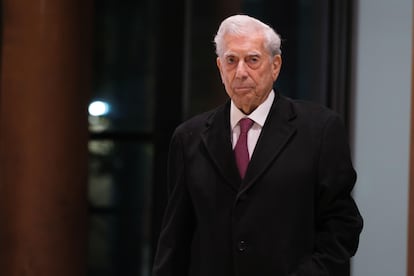‘I dedicate my silence to you’: Vargas Llosa returns to Peru with his last novel before retiring
After a writing career of over 60 years, the Nobel Prize winner says goodbye with a story in which fiction is inserted into an essay about criolla music as a magical national solution for the country’s disunity and inequality

It is impossible to repress a certain melancholy for those of us who have spent our entire lives reading the novels and essays of Mario Vargas Llosa, because after a career spanning more than six decades (the stories in Los Jefes were written in 1959), the great writer from Arequipa has announced that, as he faces his 88th birthday, he will be retiring after the recent publication of his latest novel, Le dedico mi silencio (or I dedicate my silence to you) and an upcoming essay on Jean-Paul Sartre. For his retirement from writings novels, a genre in which he has produced an astonishing number of masterpieces (from The Time of the Hero and The Green House to Conversation in the Cathedral, The War at the End of the World or The Feast of the Goat), Vargas Llosa has chosen to return to his native Peru, a nation engulfed and afflicted by social differences. He has also gone back to a frequent stratagem in his work: that of inserting into fiction the process of writing a book, in this case an essay on criolla music (waltzes, huainos, marineras…) as a magical national panacea for the disunity and inequality breaking up the country.
The person who holds this utopian thesis is Toño Azpilcueta, a sad “proletarian intellectual” unable to support his family, who one night is dazzled by the guitarist Lalo Molfino. In an ineffable stroke of genius he glimpses a patriotic reflection, the cohesive force with which criolla music has healed the deep divisions of the country. Hence the purpose of writing a book about Molfino that will be both a passionate and erudite history of Peruvian folk music. In this way, Vargas Llosa alternates the chapters that reproduce passages from that book in progress with the investigations and adventures of Azpilcueta himself, combining narration and essay and achieving a rare balance that makes us interested in both the future of the Peruvian waltz and the plot that revolves around the main character. Thus, we go from the cradle of criolla songs in the Pampa de Amancaes to the patriarchal figure of Felipe Pinglo Alba (who died the same year Vargas Llosa was born), from the internationalization promoted by Chabuca Granda (author of La flor de la canela) to the singer Cecilia Barraza, who in the novel is Azpilcueta’s friend and platonic love. And, in parallel, we see how he, victim of an irrepressible phobia towards rats, becomes obsessed with his book, how he neglects his family and how he remains blind to the evidence that Peru is broken and has been bleeding since the Shining Path emerged in 1970 (page 16) until its leader Abimael Guzmán fell in 1992 (page 172).
References to the terrorist group punctuate the novel, which underlines the naivety of the character’s doctrine and, implicitly, the fragility and ineffectiveness of simple solutions (such as criolla music) for complex problems (the creation of a national sentiment that integrates rich and poor, Indigenous people, cholos and whites, mountain people and coastal people…). And although simple messages may be attractive and resonate at first, as happens with Azpilcueta’s dream of a mestizo and peaceful Peru, their very inconsistency ends up dissolving them when they are put to the test or when, to test them, reality is ignored or manipulated, which is what the deluded folklorist does with the couple made up of Toni and Lala (an emblem of the union of opposites).
Vargas Llosa did not want to bid goodbye to novel writing simply with a tribute to his beloved criolla music but, while offering a study about it and the vision of the sentimental world that it expresses, huachafería (don’t miss the magnificent chapter 26), he also wanted to reflect on how well-intentioned but reductive idealism leads to deception, defeat and melancholy. If Lalo Molfino says goodbye to Cecilia Barraza, dedicating his silence to her, the novelist Vargas Llosa does the same with his readers and leaves us, on the one hand, amazed at the magnitude of his writing career and, on the other, somewhat sullen at his farewell.
Sign up for our weekly newsletter to get more English-language news coverage from EL PAÍS USA Edition
Tu suscripción se está usando en otro dispositivo
¿Quieres añadir otro usuario a tu suscripción?
Si continúas leyendo en este dispositivo, no se podrá leer en el otro.
FlechaTu suscripción se está usando en otro dispositivo y solo puedes acceder a EL PAÍS desde un dispositivo a la vez.
Si quieres compartir tu cuenta, cambia tu suscripción a la modalidad Premium, así podrás añadir otro usuario. Cada uno accederá con su propia cuenta de email, lo que os permitirá personalizar vuestra experiencia en EL PAÍS.
¿Tienes una suscripción de empresa? Accede aquí para contratar más cuentas.
En el caso de no saber quién está usando tu cuenta, te recomendamos cambiar tu contraseña aquí.
Si decides continuar compartiendo tu cuenta, este mensaje se mostrará en tu dispositivo y en el de la otra persona que está usando tu cuenta de forma indefinida, afectando a tu experiencia de lectura. Puedes consultar aquí los términos y condiciones de la suscripción digital.








































